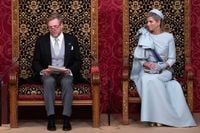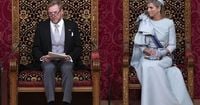On September 16, 2025, King Willem-Alexander of the Netherlands took to the stage in The Hague, delivering a speech that reverberated far beyond the ornate walls of the theater where both houses of parliament had gathered. With the country preparing for its fourth general elections in less than nine years, scheduled for October 29, the king’s words struck a chord in a nation grappling with political turmoil and deepening polarization.
“Unfortunately, people in the Netherlands seem increasingly to be at loggerheads — on the street, online, at our universities, and not least in The Hague,” the king declared, according to the Associated Press. “They have entrenched opinions for or against, black or white. As if one person being right automatically makes another wrong, while in reality the situation is almost always far more complex than that.”
His “speech from the throne,” written by the government but delivered with the gravitas of the monarchy, marked the formal opening of the Dutch political year. Yet this year’s ceremony was anything but routine. The Netherlands finds itself in a state of near-constant political flux, with the latest government collapse in June 2025 leaving Prime Minister Dick Schoof at the helm of a caretaker administration. The four-party coalition, once a delicate balance of ideologies, fell apart when Geert Wilders, the anti-immigration populist and leader of the largest party in parliament, pulled his support over disagreements on migration policy.
The fallout didn’t end there. Just two months later, in August, the center-right New Social Contract party withdrew its ministers over disputes about imposing sanctions on Israel in response to the ongoing war in Gaza. That left the caretaker government with only two parties and, crucially, without a majority in the 150-seat lower house. With limited powers, the administration is largely treading water until a new coalition can be formed after the election—a process that could take months, given the fractured political landscape.
King Willem-Alexander’s speech acknowledged the chaos but urged the nation not to lose sight of its traditions of consensus and compromise. “The government understands that it too must display an open, receptive attitude and a willingness to compromise,” he said. “Debate and differences of opinion are part of a living democracy. But so too is having the willingness to see beyond our differences and the maturity to reach out to each other.”
These calls for unity come at a time when Dutch society is feeling the strain. Polarization isn’t just a buzzword—it’s visible in daily life, from heated online debates to sharp divisions in universities and, perhaps most acutely, within the halls of government. The king’s words were a gentle reminder that democracy thrives not on perpetual confrontation but on the ability to find common ground, even when the stakes are high and emotions run hotter than ever.
But the king’s address didn’t focus solely on domestic affairs. He highlighted two foreign policy crises that loom large over the Netherlands and the world: Russia’s ongoing war of aggression in Ukraine and the humanitarian catastrophe unfolding in Gaza. “In both cases, the blood-spilling and horrific loss of human life must be brought to an end as soon as possible,” he emphasized, as reported by the Associated Press.
On Ukraine, the king was unequivocal. He affirmed that the Netherlands will “continue its path of unwavering military, diplomatic and political support until a lasting peace for Ukraine is achieved.” This commitment is not merely rhetorical. In the week prior to his speech, Dutch F-35 fighter jets flying for NATO played a direct role in intercepting Russian drones over Poland, underscoring the Netherlands’ active participation in European security efforts.
Turning to Gaza, the king acknowledged the deep divisions not just within Dutch politics but within the broader international community. The Dutch government, he said, would work “with international partners” to seek a ceasefire and would “continue pushing for an end to the violence and decent future prospects for all inhabitants of the region.” The recent withdrawal of the New Social Contract party from the caretaker government over disagreements about sanctions on Israel highlights just how contentious and emotionally charged the issue has become in Dutch politics.
For many in the Netherlands, these foreign policy challenges are not distant abstractions. The war in Ukraine has direct implications for European stability and Dutch security, while the conflict in Gaza resonates deeply with a country that prides itself on humanitarian values and a robust tradition of international law. The king’s insistence on compromise at home and constructive engagement abroad reflects a recognition that the Netherlands cannot afford to be paralyzed by division, either within its borders or on the world stage.
Yet, the road ahead is uncertain. With the caretaker coalition lacking a majority and only limited authority to enact significant policy changes, the country remains in a kind of political limbo. Forming a new government will require parties from across the spectrum to come together, set aside entrenched positions, and hammer out a working coalition—a process that, as Dutch history shows, can be painstakingly slow.
Meanwhile, the electorate faces a crowded and fragmented field. The collapse of the coalition and subsequent withdrawals have left voters with more questions than answers. Will the next government be able to restore stability and foster the spirit of compromise the king so passionately advocates? Or will the cycle of polarization and gridlock continue, leaving the Netherlands to drift through yet another period of uncertainty?
Internationally, the Dutch position remains firm but nuanced. The commitment to Ukraine is clear, with military and diplomatic support unwavering. On Gaza, the approach is more cautious, reflecting the complex realities of Middle Eastern politics and the deep divisions at home over how best to respond to the humanitarian crisis.
As the October 29 elections approach, the king’s message stands as both a warning and a hope. The Netherlands has long been admired for its pragmatic, consensus-driven approach to governance—a model that has weathered many storms. Whether that tradition can endure in the face of today’s challenges remains to be seen. But if King Willem-Alexander’s words are any guide, the path forward lies not in further entrenchment but in the difficult, often messy work of reaching across divides and finding common purpose.
In a time of political limbo and global uncertainty, the king’s call for compromise feels more urgent than ever. The coming months will reveal whether the Netherlands can rediscover its culture of consensus—or whether the forces pulling it apart will prove too strong to resist.


